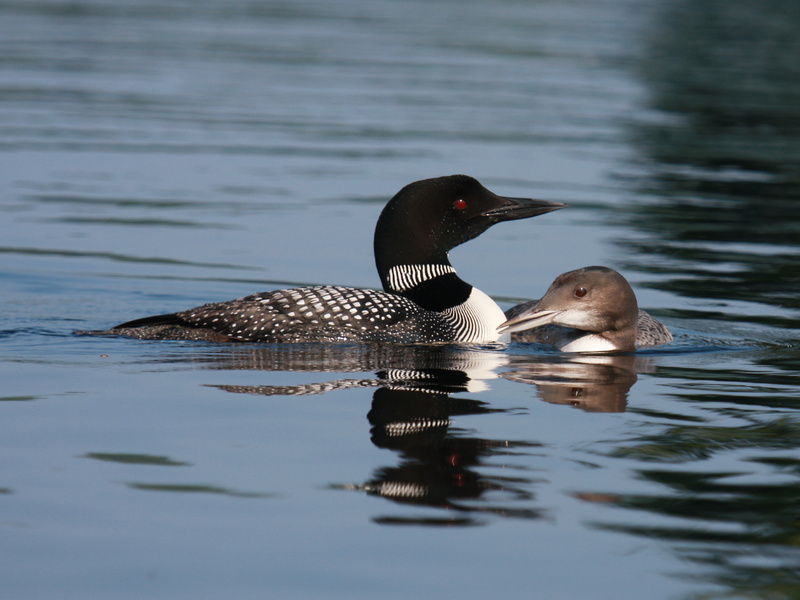I often hear the first cry of the loon on Sebago Lake in early April. And with their return, I take solace that all is right with the season.
Right now, many loons are laying their eggs along our lakes. With nests close to the water’s edge, both male and female take turns incubating the eggs for about a month. Who knows, if you’re in the right place at the right time, you may see a little loon hitching a ride on a parent’s back any time now.
According to Susan Gallo, loon project director for the Maine Audubon Society, the population in Maine is doing well. Some 2,500 birds can be found below the 45th parallel, or roughly south of Bangor.
Between 200 and 400 chicks a year are hatched in this area. Because of the inherent diversity between areas of the state, Audubon splits Maine into two groups. Factors such as development and boating activity in southern Maine differ from those in the northern part of the state, complicating data comparisons.
“The pattern for chicks revolves around roughly a two-year cycle,” Gallo said. “Numbers go up and down, which causes us to have a lot of questions about what’s behind this behavior.”
According to the 2009 Maine Audubon loon count, 88 adults and 12 chicks were found throughout the Lakes Region. This is slightly down from 2008, when 100 adults were counted. But the numbers of chicks were up: 14 were counted that year. Records for 2007 recorded 85 adults and eight chicks.
To assist in management and knowledge, an annual loon count is done on the third Saturday in July. For the last three years, Little Sebago Lake has taken the prize in the Lakes Region, with Long Lake close behind. Last year, 26 adults were counted on Little Sebago; 19 were found on Long Lake.
Apparently the picture on big Sebago isn’t too clear; the big water poses a problem for census takers. “I don’t know if we’ll ever get that lake completely surveyed,” Gallo said. “It’s just so big.”
On the third Saturday in July, volunteer loon counters head out each year from 7 to 7:30 a.m.
Elwood Beach lives on the north end of Raymond Pond and has been counting loons for the better part of 20 years. Typically, four adults can be found on this small body of water. Beach helps organize loon counts on many of the area’s lakes and agrees that getting a count on big Sebago is challenging.
“When you have surf with the waves approaching 2 feet, you can’t count birds easily,” Beach said. “They get lost in the dips.”
Others point to the habitat of big Sebago. Nate Whalen, water resource specialist for the Portland Water District, organizes the Sebago count.
“Right now we have between six and 10 volunteers counting,” he said. “We’re able to get about 20 percent of the lake. Loons tend to like a varied shoreline with protected coves. Sebago has long stretches of shoreline.
“Plus, the date of the count is always predetermined. If it’s a rainy, windy day you’re probably not going to see many birds.”
Given these factors and despite the lake’s great size, only four adults were counted on Sebago last year. No chicks were reported. Records for 2008 showed 10 adults and five chicks. Numbers in 2007 were five adults and no chicks.
Whalen welcomes volunteers to assist in a more accurate Sebago census. Contact him at nwhalen@pwd.org.
And there are talented photographers in our midst who enjoy photographing loons. Maine Audubon encourages folks to submit entries for the 2010 Loon Project Photo Contest, the second annual competition. The top two finishers in each division will receive an 8-by-10-inch photograph professionally framed by Casco Bay Frames and Gallery of Portland. All awardees will also be recognized in Maine Audubon’s newsletter Habitat.
For more information on loons, including census data, and details on the photo contest, including last year’s winners, visit www.maineaudubon.org/conserve/loon/index.html.
Don Perkins is a freelance writer who lives in Raymond. He can be reached at: presswriter@gmail.com
Send questions/comments to the editors.



Success. Please wait for the page to reload. If the page does not reload within 5 seconds, please refresh the page.
Enter your email and password to access comments.
Hi, to comment on stories you must . This profile is in addition to your subscription and website login.
Already have a commenting profile? .
Invalid username/password.
Please check your email to confirm and complete your registration.
Only subscribers are eligible to post comments. Please subscribe or login first for digital access. Here’s why.
Use the form below to reset your password. When you've submitted your account email, we will send an email with a reset code.